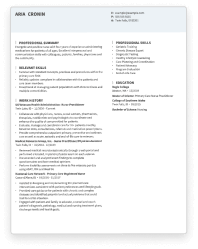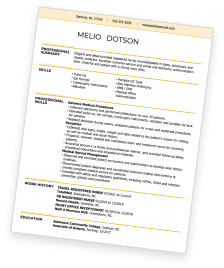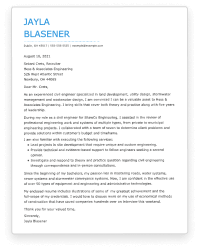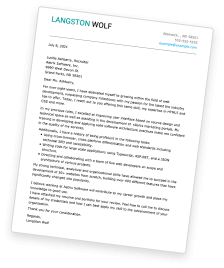Executive Chef Resume: Overview
As an executive chef, you are responsible for culinary creativity and leadership. You lead kitchen teams, create innovative menus, manage inventory, ensure food safety standards, and deliver exceptional dining experiences.
To excel in this role, you need culinary expertise, management skills, creativity, and adaptability.
Executive chefs work in various culinary environments, including:
- High-end restaurants
- Hotels and resorts
- Catering companies
- Cruise ships
- Corporate dining facilities
To land your dream job as an executive chef, you need a resume that highlights your skills, experiences, and achievements to stand out in the competitive culinary industry.
If you are ready to create an impressive resume, check out our professionally designed resume examples and downloadable templates.
Executive Chef Resume: Choose a Format
Choosing the right resume format is vital to showcase your qualifications effectively. Your resume format should be suited to put your unique qualifications and level of experience in the best possible light.
Chronological Resumes for an Executive Chef
A chronological resume format is like taking a journey through your culinary career. It’s perfect if you’ve been cooking up a storm for years!
To create a chronological resume, you list your experiences from most recent to oldest, showing how you’ve grown as a manager and mastered your craft over time.
This format works wonders for executive chefs with extensive experience, allowing you to highlight your career progression, notable achievements, and delicious contributions to the culinary world in a clear and organized manner.
Functional Resumes for Executive Chef
Functional resumes, on the other hand, focus on showcasing your abilities rather than your work history. They’re like a well-crafted menu, highlighting your culinary expertise, leadership skills, and creative flair.
This format is ideal for executive chefs who want to emphasize their talents, especially if their work history is diverse or non-linear.
Whether you’re a seasoned pro or just starting your culinary journey, a functional resume lets you emphasize your skills and qualifications without tying them to a career timeline.
While this format can work well for some, it is important to note that it is not very compatible with applicant tracking systems (ATS). Most employers will place a high value on your work history and look for those details in the initial screening process.
Combination Resumes for Executive Chef
Combination resumes blend elements of both chronological and functional formats, offering the best of both worlds.
This format allows you to showcase your skills and qualifications while also providing a detailed work history.
If you have a diverse skill set, and some relevant experience as an executive chef– a combination resume lets you showcase your culinary journey in a way that’s both comprehensive and compelling.
Choosing a Resume Format
When deciding on the right resume format for your executive chef resume, consider the unique ingredients of your culinary career.
Whether you opt for a chronological, functional, or combination format, the goal is to present yourself as the top chef in the kitchen, ready to lead and innovate with your culinary creations.
When in doubt, experts recommend a chronological format. Even if you lack relevant experience or have gaps in employment, you can tailor your resume format to showcase your qualifications and experience, just like you would tailor a dish to suit your diners’ tastes.
For example, you can highlight the skills that transfer from previous jobs, even if the job title seems unrelated to an executive chef position.
If your previous jobs required managing a team, overseeing budgets, or other administrative tasks, showcase that experience to highlight your qualifications as an executive chef.
How to Write an Executive Chef Resume
Once you choose a resume format and template, you can begin working on the content of your resume! The process is pretty straightforward, like following a recipe.
There are five essential sections that outline an executive chef’s resume:
- Contact Information
- Professional Summary or Objective Statement
- Work History
- Skills
- Education
You can also provide sections with additional information, such as certifications or awards, if they are relevant and help further demonstrate your qualifications for the executive chef position.
Knowing how to write a resume means understanding how each section plays a part in making an impression on hiring managers and landing an interview. Let’s take a further look!
Contact Information
First, ensure your contact information is up-to-date and easy to find at the top of the page.
Your contact information should include your name, city and state, phone number, email address, and, optionally, your LinkedIn profile URL.
If you include a LinkedIn profile, ensure your picture and profile information are current and professional to make the best impression.
A contact section of an executive chef’s resume can be formatted in several ways, depending on the design of your resume. However, it will most likely look something like this:
Joe Cook
Midland, Tx
JoeCook@fake-email.com
555-555-5555
fake.linkedin/in/joecook33
Remember to check carefully for typos and use an easily readable font to ensure employers can contact you!
Summary or Objective
Next, you will craft a captivating summary or objective statement to introduce yourself and entice the reader to learn more about you.
A professional summary briefly overviews your professional background, skills and qualifications. It works best for an experienced executive chef because it highlights your work experience.
For example, a professional summary for an experienced executive chef might say:
Passionate executive chef with over a decade of experience in high-volume culinary operations. Proven track record of leading kitchen teams, developing innovative menus, and delivering exceptional dining experiences. Skilled in menu development, cost control, and staff training.
If you are transitioning careers or looking for your first role as an executive chef, an objective statement might be the best choice. Objective statements focus on your career goals, passion for the job and personal qualities that make you a great candidate.
For example, a resume objective for an aspiring executive chef might say:
Dedicated sous chef seeking an opportunity to leverage culinary expertise and leadership skills as an executive chef in a dynamic restaurant environment. Committed to delivering high-quality cuisine, driving operational excellence, and exceeding customer expectations.
Whether you choose a summary or an objective, this section of your resume can be tailored to each job you apply for. Use keywords from the job description to help your resume stand out to the ATS and be selected for further consideration.
Work History
Your work history is the main course of your executive chef resume, showcasing your culinary journey and achievements.
Start by listing your previous jobs in reverse chronological order, starting with your most recent position. Each job entry should include your job title, employer’s name and location, and dates of employment.
Then, beneath each entry, you will write three bulleted sentences detailing your most relevant responsibilities and accomplishments in each role.
When describing your previous work experience, use action verbs to convey a proactive approach and to make your resume more compelling to the reader. Whenever possible, use numbers and percentages to quantify your achievements and demonstrate your impact in previous roles.
Your work history section should be well-organized and easy to read. You can format this section in various ways depending on your resume template. Typically, it will look something like this:
Executive Chef
XYZ Restaurant, Des Moines, IA (2018-Present)
- Revitalized menu offerings, spearheading a creative overhaul that resulted in a remarkable 20% increase in customer satisfaction.
- Implemented innovative cost-saving measures, leading to a significant 15% reduction in food waste and a notable improvement in profit margins.
- Mentored and trained kitchen staff in best practices, fostering a culture of excellence and teamwork that contributed to the restaurant’s success.
Notice how this example provides a clear snapshot of the chef’s responsibilities and showcases their ability to drive positive outcomes and elevate the culinary experience for both patrons and the restaurant’s bottom line.
Customize this section to align with the job description to make your resume ATS-friendly. For instance, if the job mentions menu design, you can include a bullet describing your experience creating menus in a previous role.
Skills
Next, you will create a dedicated skills section to showcase your expertise as an executive chef.
Top executive chefs need technical expertise in inventory management, food handling, and kitchen staff management.
However, they also need soft skills like creativity, attention to detail and team building.
A well-crafted skills section on your executive chef resume should showcase a balance of hard and soft skills tailored to the demands of the culinary industry.
For inspiration, here are the top five hard skills and soft skills for an executive chef resume:
Top 5 Hard Skills for Executive Chef Resumes
- Culinary Creativity: Executive chefs must possess a keen sense of creativity to develop innovative menus and dishes that captivate diners’ palates.
- Kitchen Management: Effective management of kitchen operations, including staff supervision, inventory control, and workflow optimization, is critical for success in this role.
- Menu Development: Executive chefs should excel in menu planning and development, incorporating seasonal ingredients, dietary preferences, and culinary trends to create memorable dining experiences.
- Food Safety Compliance: Ensuring adherence to strict food safety standards and regulations is paramount to protect diners’ health and maintain the restaurant’s reputation.
- Budget Management: Expertise in budgeting and financial management is essential for controlling costs, maximizing profitability, and achieving financial objectives.
Top 5 Soft Skills for Executive Chef Resumes
- Leadership: Effective leadership skills are crucial for guiding kitchen teams, fostering a positive work environment, and inspiring culinary excellence.
- Communication: Clear and concise communication is essential for coordinating kitchen operations, collaborating with staff, and interacting with vendors and management.
- Adaptability: Executive chefs must be adaptable to navigate unforeseen challenges, accommodate changing menus or dietary restrictions, and maintain high standards of quality and service.
- Time Management: Efficient time management skills enable executive chefs to prioritize tasks, meet deadlines, and ensure smooth kitchen operations during peak service hours.
- Problem-Solving: Quick thinking and effective problem-solving abilities are vital for resolving kitchen-related issues, handling culinary emergencies, and maintaining guest satisfaction.
By highlighting your proficiency in culinary creativity, kitchen management, leadership, and other essential skills, you’ll position yourself as a top candidate for coveted culinary positions.
For example, a skills section for an executive chef’s resume might look like this:
Skills
- Culinary Creativity
- Kitchen Management
- Menu Development
- Budget Management
- Communication
- Adaptability
- Time Management
- Problem-Solving
Education
Next, you will include your educational background, culinary degrees, certifications, or relevant coursework. List your highest level of education first, along with the degree earned and the institution’s name and location.
For example, an education section for an executive chef’s resume may look like this:
Bachelor of Science in Culinary Arts
XYZ Culinary Institute, New York, NY
It’s not necessary to include your graduation date, but you may choose to include relevant coursework, grade point average or awards and honors you received. However, you can also create additional sections to draw attention to that information.
Additional Sections
Once you have carefully crafted the above sections of your resume, consider including additional sections to further highlight your qualifications and set yourself apart from the competition.
Some additional sections to consider are:
- Awards and Honors
- Professional Associations
- Relevant Volunteer Experience
- Languages Spoken
- Certifications
Top Certifications for Executive Chefs
You can enhance your executive chef resume with industry-recognized certifications that validate your expertise and commitment to professional excellence. Consider obtaining certifications such as:
- Certified Executive Chef (CEC): This certification is offered by the American Culinary Federation (ACF) and verifies your work experience and education in critical areas like food safety, supervisory management, cost control, beverage management and nutrition.
- ServSafe Food Protection Manager Certification: Obtaining this certification verifies your knowledge of the safe preparation and serving of food.
- Worldchefs Global Culinary Certification: This prestigious skills recognition program validates your culinary skills, knowledge and experience against a global benchmark.
- Certified Food and Beverage Executive (CFBE): This certification is equivalent to an associate degree and requires at least two years of work experience.
These certifications demonstrate your dedication to professional development and can set you apart in a competitive job market.
8 Tips for Writing an Executive Chef Resume
Tailor Your Resume: Customize your resume for each job application by emphasizing skills and experiences relevant to the position. For example, highlight your expertise in menu development, kitchen management, and culinary creativity to align with the employer’s needs.
Quantify Achievements: Provide concrete examples of your accomplishments using specific numbers and metrics whenever possible. For instance, quantify the percentage increase in customer satisfaction or the reduction in food waste achieved through your initiatives.
Showcase Leadership: Highlight your leadership abilities to stand out as an executive chef. Describe how you have recruited, trained and managed kitchen staff to create exceptional guest experiences.
Use Action Verbs: Use strong action verbs to describe your accomplishments and responsibilities in your work history. Words like “spearheaded,” “implemented,” and “mentored” convey proactive involvement and leadership in kitchen operations.
Incorporate Keywords: Optimize your resume for applicant tracking systems (ATS) by incorporating industry-specific keywords and terminology. Research job descriptions and industry trends to identify relevant keywords related to culinary techniques, kitchen management software, and industry certifications.
Proofread Carefully: Thoroughly proofread your resume to ensure it is free of errors and typos. Attention to detail is crucial in the culinary world, so demonstrate your commitment to excellence by presenting a polished and error-free resume.
Keep It Concise: Keep your resume concise and focused, aiming for a maximum of two pages. Prioritize relevant experiences and accomplishments, and avoid including unnecessary details that may clutter your resume.
Seek Feedback: Seek feedback from peers, mentors, or professional resume writers to ensure your resume effectively showcases your strengths. Consider joining professional culinary associations or networking groups to connect with industry professionals who can provide valuable insights and advice.
View Similar Resumes
- Executive Chef Resume
- Sushi Chef Resume
- Cook Resume
- Restaurant Assistant Manager Resume
- Restaurant Manager Resume
- Baker Resume
- Dishwasher Resume
- Pastry Chef Resume
- Prep Cook Resume
- Line Cook Resume
- Kitchen Manager Resume
- Restaurant General Manager Resume
- Chef Resume
- Fast Food Manager Resume
- Sous Chef Resume


Use Hloom's Resume Builder
Key Takeaways
- A standout executive chef’s resume highlights culinary expertise, leadership skills, and creativity.
- Choose a resume format that puts your experience and skills in the best possible light.
- Tailor your resume to each job application by including keywords from the job description to ensure your
- resume stands out to applicant tracking systems (ATS) and hiring managers.
- Use action verbs and quantify achievements to make your resume more compelling.
- Proofread your resume carefully to demonstrate your meticulous attention to detail.
Use Hloom's Cover Letter Builder














